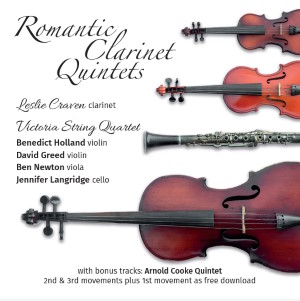
Romantic Clarinet Quintets
Johannes Brahms (1833-1897)
Clarinet Quintet in B minor, Op.115 (1891)
Carl Maria von Weber (1786-1826)
Clarinet Quintet in B flat major, Op.34, J182 (1815)
Arnold Cooke (1906-2005)
Clarinet Quintet (1962)
Leslie Craven (clarinet)
Victoria String Quartet
rec. 2022, Nimbus Concert Hall, Wyastone Leys, UK
Musical Concepts MC9246 [83]
The Brahms-Weber diptych is not novel on disc. In fact, it’s quite common and several examples are available. However, Leslie Craven and the Victoria String Quartet stake their own place in the catalogue with just such a coupling, adding the second and third movements of Arnold Cooke’s Clarinet Quintet. Buy the disc and you get a download of the complete work plus a few streaming extras (available complete through digital downloads and streaming, link below).
Craven was the long-serving principal clarinettist of the Welsh National Opera before which he was a guest principal of most of London’s leading orchestras. The members of the Victoria Quartet – Benedict Holand, David Greed, Ben Newton and Jennifer Langridge – are, successively, guest leader of the RLPO and CBSO, the leader of Orchestra of Opera North, guest principal of the Sinfonia of London and cellist in the Psappha Quartet. Formidable credentials.
The resonant acoustic of Wyastone’s Concert Hall is inescapable but all the instruments are held securely in the recording spectrum; nothing is muddy and fudged acoustically. It brings a welcome warmth to the ensemble’s approach which is itself attractively warm. It’s also flexible metrically and it’s noticeable how deft this device is which, coupled with the ensemble’s textual clarity, ensures that the playing isn’t heavy, the tonal weight of the string players being refined. The gentle lyricism of the second movement generates a wistful, withdrawn intensity in this reading, as well as sensitive phrasing. Craven’s eloquent phrasing, as if across the barlines, brings a kind of peripatetic rubato to the playing. Contrapuntal lines in the scherzo are clear and crisp, as are Craven’s acrobatic roulades. Well characterised and balanced and not over-pressed, the finale coheres well, less wistful than one often hears, but more cohesive as a result.
Weber the operatic showman can be encountered in his Clarinet Quintet. Here the quartet has a largely supportive role to the clarinettist-coloratura soloist. Dynamics Are fine and the performance is lively and colourful, Craven relishing the fantasia as much as the pathos of the second movement, as much as he enjoys the dialogue with Langridge’s cello in the third movement. When Weber finally unleashes the string quartet in the finale, they seize the chance to interplay with the clarinet.
The Cooke was recorded back in 1990 by Thea King and the Britten String Quartet on CDA66428, later reissued on Helios CDH55105. It’s coupled with works by Howells, Maconchy, Frankel and Holbrooke. The tempi that Craven and the Victoria String Quartet are similar to that older recording; the performance is sensitive, controlled but eloquent, fluently lyrical and integrated, with hints of Hindemith, notably in the finale.
There are number of options for the Brahms-Weber coupling as I noted. Béla Kovács and the Kodály Quartet on Hungaroton are fast and sprightly in the Brahms, but Richard Stoltzman and the Tokyo are more circumspect tempo-wise on RCA. There are others, of course – Eddie Daniels and the Composers String Quartet is another – but these are two fine-sounding versions.
Craven and the Victorians will, however, make friends for the warmly textured and rubato-savvy performance of the Brahms in particular.
Jonathan Woolf
Availability (CD): The Clarinet Company
Availability (Download): Musical Concepts


















